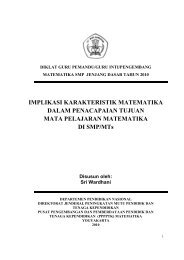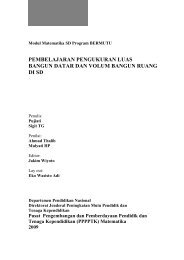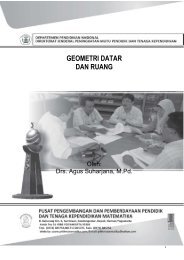25 Biggest Mistakes Teachers Make and How to Avoid Them
25 Biggest Mistakes Teachers Make and How to Avoid Them
25 Biggest Mistakes Teachers Make and How to Avoid Them
You also want an ePaper? Increase the reach of your titles
YUMPU automatically turns print PDFs into web optimized ePapers that Google loves.
Mistake 17: Academic Shortcomings<br />
I tried <strong>to</strong> do this in a humorous way. It<br />
worked for me. Sometimes students<br />
would give their own genuine apology<br />
<strong>and</strong> they would play <strong>to</strong>gether at<br />
recess.<br />
Years ago I visited a classroom<br />
that had a rule posted that said,<br />
143<br />
“H<strong>and</strong>s are for hugging <strong>and</strong> for loving.”<br />
I was really impressed with the<br />
prosocial message in this rule. My<br />
hope is that more teachers will adopt<br />
prosocial rules for their classroom<br />
that extends beyond the traditional<br />
“Don’t do this <strong>and</strong> don’t do that.”<br />
SCENARIO 17.3<br />
A Know-a-Little <strong>and</strong> a Know-It-All<br />
I cannot pinpoint a specific negative experience. The general ideas that come <strong>to</strong> mind<br />
include a teacher who did not know her content area as well as I did as a student. We<br />
often had arguments about answers that I would win. Another teacher <strong>to</strong>ld students they<br />
were “misguided <strong>and</strong> wrong” if they did not agree with his interpretations of his<strong>to</strong>ry.<br />
Some above-average students<br />
have an overinflated sense of<br />
what they think they know. In some<br />
cases they’re not teachable because<br />
they think they know more than the<br />
teacher knows. On the other h<strong>and</strong>,<br />
sometimes these students are correct;<br />
sometimes they do know more than<br />
the teacher knows about the content<br />
area. Some teachers have an overinflated<br />
sense of what they know about<br />
their subject <strong>and</strong> fail <strong>to</strong> adequately<br />
prepare for their lessons. I was supervising<br />
a student teacher who found<br />
herself in the embarrassing predicament<br />
of not knowing some fifthgrade<br />
math. She informed me later<br />
that she was so sure that fifth-grade<br />
math would be easy that she didn’t<br />
bother <strong>to</strong> prepare for the lesson.<br />
Wise teachers seldom take content<br />
for granted. If they have been<br />
teaching for awhile, they know that<br />
content may reflect new developments,<br />
techniques, concepts, <strong>and</strong> under -<br />
st<strong>and</strong>ings. Most teachers know that<br />
nothing is constant but changes, <strong>and</strong><br />
that it pays off in instructional dividends<br />
<strong>to</strong> be prepared. Advanced<br />
preparation of lessons helps teachers<br />
pinpoint areas of weakness before<br />
they present the information <strong>to</strong> students.<br />
Resourceful teachers make<br />
productive use of this advanced<br />
warning <strong>to</strong> correct any deficiencies<br />
that are apparent.<br />
The second example in this scenario<br />
features a very authoritarian<br />
approach <strong>to</strong> instruction. The teacher<br />
seems <strong>to</strong> think he’s all knowing <strong>and</strong><br />
students are misguided <strong>and</strong> wrong<br />
if they don’t agree with him.<br />
Constructivist teachers know that<br />
it’s important <strong>to</strong> help students construct<br />
their own meaning <strong>to</strong> make<br />
sense of the world (Anderson, 1989).<br />
They are aware that it’s difficult <strong>to</strong><br />
do that if they discount their students’<br />
contributions. These teachers<br />
realize they must let students have a<br />
voice <strong>and</strong> a choice in instructional<br />
matters. Belenky et al. (1986) suggest<br />
that teachers learn <strong>to</strong> trust <strong>and</strong><br />
respect each student’s experience.





